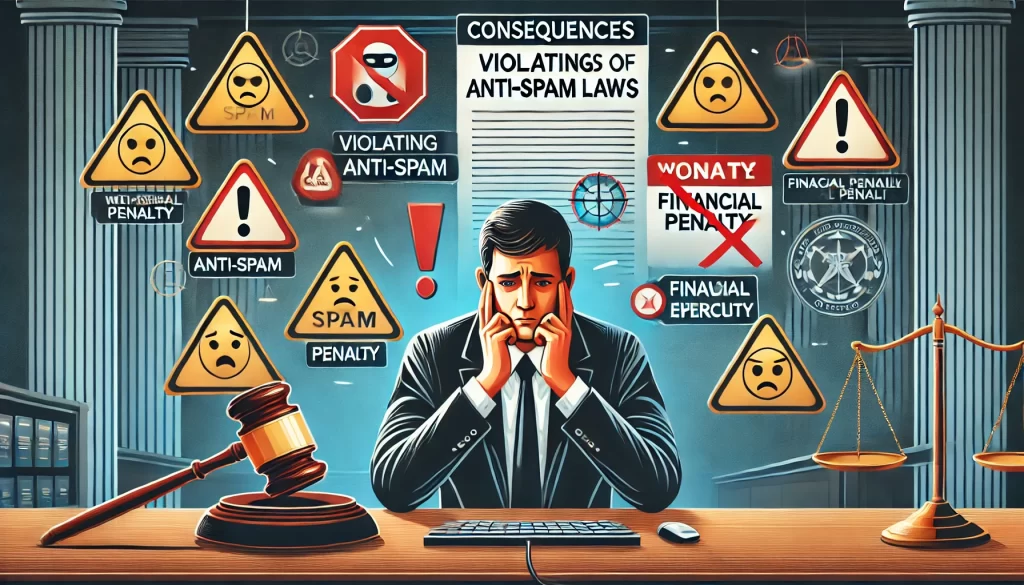What Are Anti-Spam Laws and Their Purpose?
In today’s digital world, email marketing has become a vital tool for businesses, including law firms, to reach out to potential clients, nurture existing relationships, and market services. However, the rise of email communication has also led to the proliferation of spam—unwanted, unsolicited emails that flood inboxes. To address this, governments worldwide have introduced anti-spam laws to regulate email marketing and protect consumers from harmful, invasive practices.
Anti-spam laws are designed to ensure that businesses send marketing emails responsibly, providing recipients with the ability to opt-out of unwanted communication while ensuring transparency in marketing practices. These laws not only protect consumers but also help businesses maintain ethical marketing standards, preventing deceptive practices.
For law firms, adherence to anti-spam regulations is crucial to avoid hefty fines and reputational damage. In this article, we will explore the purpose of anti-spam laws, review key anti-spam regulations like CAN-SPAM and GDPR, and offer practical compliance tips for law firms.

Anti-Spam Regulations in the US and Globally
When it comes to anti-spam regulations, different countries have established distinct rules that businesses must follow. Below, we’ll explore two of the most significant anti-spam regulations, CAN-SPAM (U.S.) and GDPR (EU) to understand the scope and implications of these laws.
The CAN-SPAM Act (USA)
The CAN-SPAM Act (Controlling the Assault of Non-Solicited Pornography and Marketing) was signed into law in 2003 to regulate unsolicited commercial emails in the United States. The law is designed to give consumers more control over the emails they receive, ensuring that businesses cannot spam users with irrelevant or deceptive emails.
Key provisions of the CAN-SPAM Act include:
- Accurate Header Information: Businesses must not use false or misleading “From,” “Reply-To,” or “Subject” lines.
- Clear Identification of Commercial Content: Every commercial email must clearly indicate its purpose and identify the sender.
- Unsubscribe Option: All marketing emails must include a clear and easy-to-use option for recipients to unsubscribe from further emails.
- Processing Opt-Out Requests: Businesses must honor unsubscribe requests within 10 business days and refrain from sending further emails to individuals who have opted out.
- Physical Address Requirement: Every email must contain a valid physical postal address for the sender, which could be a street address or a P.O. box.
The CAN-SPAM Act applies to any business, including law firms, that sends commercial emails to U.S.-based recipients. Non-compliance with the law can result in significant penalties, with fines up to $43,280 per violation.
Related Posts
The General Data Protection Regulation (GDPR) (EU)
The General Data Protection Regulation (GDPR), implemented in 2018, is a comprehensive data protection law enforced across the European Union (EU) and the European Economic Area (EEA). While the GDPR is broader in scope than just anti-spam regulations, it has strict rules on email marketing and the processing of personal data, which makes it highly relevant to law firms engaging in email marketing.
Key GDPR provisions for email marketing include:
- Consent-Based Marketing: Under the GDPR, businesses must obtain explicit consent from individuals before sending marketing emails. This consent must be freely given, specific, informed, and unambiguous.
- Right to Withdraw Consent: Users must be able to withdraw their consent at any time, and businesses must honor this request.
- Data Minimization: Businesses are only allowed to collect and process the personal data necessary for sending marketing communications.
- Transparency: The GDPR requires businesses to inform recipients about how their data will be used and give them a clear option to unsubscribe at any time.
- Security of Data: Businesses must ensure that all personal data is processed securely and protected against unauthorized access.
For law firms that serve clients in the EU or target EU-based clients, the GDPR imposes stricter email marketing rules than CAN-SPAM, especially regarding consent and data processing. Violations of the GDPR can result in penalties of up to €20 million or 4% of global annual turnover, whichever is greater.

How Law Firms Can Avoid Penalties and Stay Compliant
For law firms, compliance with anti-spam laws is essential to maintain credibility, avoid costly fines, and build strong client relationships. Below are practical steps law firms can take to ensure they remain compliant with both CAN-SPAM and GDPR:
Obtain Explicit Consent
Under both CAN-SPAM and GDPR, law firms must ensure that recipients have opted in to receive marketing emails. While CAN-SPAM does not require explicit consent for non-transactional emails, GDPR mandates that law firms obtain clear and unambiguous consent before sending marketing communications.
Law firms should use double opt-in methods, where recipients confirm their consent twice (e.g., by checking a box and then confirming via an email), to demonstrate clear and valid consent.
Include Easy-to-Use Opt-Out Mechanisms
Both CAN-SPAM and GDPR require that all marketing emails include a simple, functional method for recipients to unsubscribe. Law firms should prominently display an unsubscribe link in every marketing email, making it easy for clients or potential clients to opt out of future communications.
Unsubscribe requests must be processed promptly, as required by CAN-SPAM (within 10 business days), and any unsubscribe request under GDPR must be honored immediately.
Be Transparent About Data Usage
Law firms must be transparent about the way they collect, store, and use recipients’ data for email marketing. Under the GDPR, firms are obligated to inform individuals about the purpose of collecting their data and how their data will be processed.
This transparency should be reflected in a firm’s privacy policy, where clients can find clear information about their rights regarding email marketing and data processing.
Maintain Accurate and Secure Email Lists
To stay compliant with both CAN-SPAM and GDPR, law firms must maintain accurate email lists and ensure that personal data is securely stored and protected from unauthorized access. Firms should avoid using third-party email lists unless they can verify that the data was collected lawfully and with consent.
Data security is especially critical under GDPR, which imposes stringent penalties for any data breaches. Law firms should implement strong encryption and access controls to safeguard sensitive client information.
Regularly Review Email Marketing Practices
Law firms should regularly audit their email marketing practices to ensure continued compliance with CAN-SPAM and GDPR. It’s essential to stay informed of any changes in regulations and adapt marketing strategies accordingly.
Firms may consider working with compliance experts or digital marketing professionals to help ensure that their email marketing efforts align with both U.S. and European laws.
Related Posts
Contact Us for Email Compliance Solutions for Your Law Firm
Navigating the complex world of anti-spam laws can be challenging, especially for law firms that serve clients both domestically and internationally. At Shmai.Com, we specialize in helping law firms stay compliant with email marketing regulations like CAN-SPAM and GDPR.
Contact us today to learn how we can help you implement effective, compliant email marketing strategies that protect your firm from penalties and enhance your client relationships.
FAQs
What are the key provisions of the CAN-SPAM Act?
The CAN-SPAM Act requires businesses to avoid deceptive subject lines, provide opt-out options, honor unsubscribe requests, and include a physical address in all marketing emails.
How does GDPR affect email marketing?
Under GDPR, businesses must obtain explicit consent before sending marketing emails, offer the right to withdraw consent at any time, and ensure data security.
Can law firms send email marketing without consent?
Under CAN-SPAM, consent is not explicitly required for non-transactional emails, but GDPR mandates explicit consent for EU-based recipients.
What penalties exist for violating anti-spam laws?
Violations of CAN-SPAM can result in fines of up to $43,280 per email, while non-compliance with GDPR can lead to fines of up to €20 million or 4% of global turnover.
How can law firms stay compliant with anti-spam laws?
Law firms must obtain clear consent, include unsubscribe options, maintain secure email lists, and be transparent about data usage to comply with both CAN-SPAM and GDPR.
Key Takeaways
Understanding and adhering to anti-spam laws such as CAN-SPAM and GDPR is essential for law firms that engage in email marketing. Compliance with these regulations not only helps avoid substantial penalties but also builds trust with clients. By maintaining clear, transparent practices around consent, data security, and opt-out options, law firms can create ethical email marketing campaigns that support their growth while protecting their reputation.
- Anti-spam laws like CAN-SPAM and GDPR regulate email marketing and protect consumers from unsolicited communications.
- Law firms must obtain explicit consent, maintain accurate lists, and offer easy opt-out methods to comply with these laws.
- Violating these laws can result in heavy fines and damage to a firm’s reputation.
Stay informed and audit email marketing practices regularly to ensure compliance.
